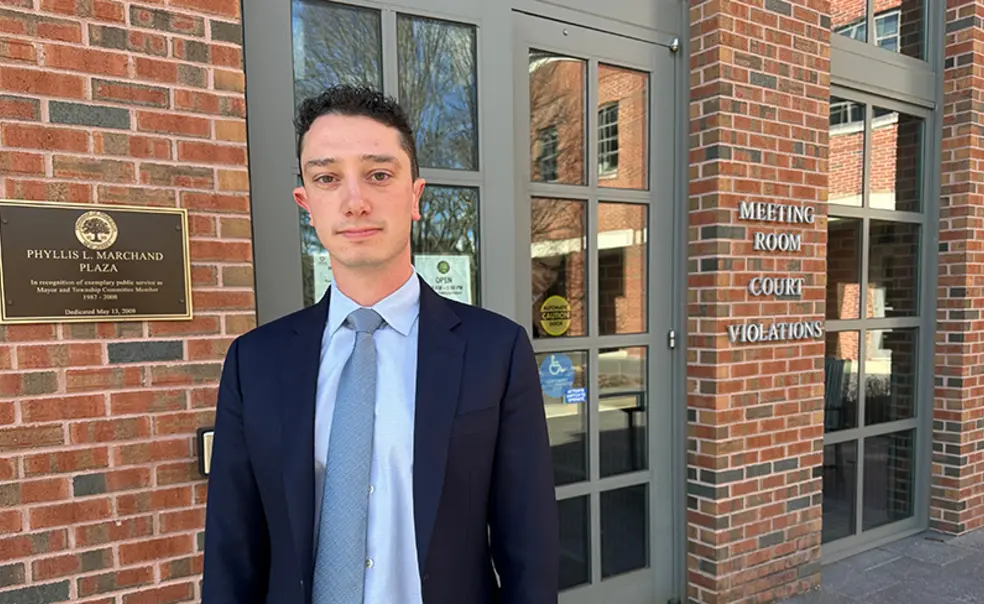David Piegaro ’25 Sues Princeton Over Altercation with Public Safety Head
Piegaro filed the lawsuit after being found not guilty of assaulting the University’s assistant vice president for public safety during a 2024 protest
David Piegaro ’25 is alleging in a lawsuit that Princeton’s assistant vice president for public safety, Kenneth Strother Jr., “deliberately used excessive force” when he “picked him up and dropped him down” a flight of stairs during a 2024 protest next door at Clio Hall, leaving Piegaro with a concussion and post-traumatic stress disorder.
The lawsuit also says Strother and other “Princeton employees” knowingly lied when they said it was Piegaro who assaulted Strother, which led to criminal charges of which Piegaro was cleared in April.
“Princeton and Chief Strother had no reasonable excuse for this abhorrent conduct — so they made one up,” the lawsuit says.
The complaint was filed Wednesday, July 30, in U.S. District Court for the District of New Jersey against both Strother and Princeton’s Board of Trustees. It seeks unspecified damages and expungement of his records with Princeton.
Strother declined to comment, but University spokesperson Jennifer Morrill told PAW, “The University believes the complaint to be entirely without merit and plans to mount a vigorous defense. We look forward to a fair trial and expect our position to be fully vindicated.”
The lawsuit says that prior to the pro-Palestinian protest on April 29, 2024, Piegaro — who is Jewish and a former president of the University’s Student Veterans Association — and a friend had been keeping Princeton officials apprised of protesters’ plans to build an encampment.
When a group of students tried to occupy Clio Hall that evening, Piegaro was there acting as a citizen journalist, the lawsuit says. He saw a professor he knew was involved with the protesters — Max Weiss — talking with two other men, and began filming a video as he followed them to neighboring Whig Hall and up the stairs.
During the assault trial that concluded in April, two accounts emerged of what happened. Strother described putting out his arm in an attempt to prevent Piegaro’s entry into Whig Hall, allegedly leading to the student “pushing and grabbing” Strother. Strother said he was not injured but uncomfortable and surprised, and found it “hard to control” Piegaro, so he let go, leading Piegaro to fall down some of the front steps leading up to Whig. Piegaro was then arrested.
Piegaro testified that during the incident he didn’t recognize Strother, who was in civilian clothes, or know he was affiliated with law enforcement. He said it was Strother who first touched him by grabbing him and lifting him up, leading to Strother “drop[ping] or throw[ing] me down the stairs at Whig Hall.” He was diagnosed with a concussion and rib injuries, and the lawsuit says the incident also led to “economic injuries, and severe emotional distress, including post-traumatic stress disorder and anxiety.” Piegaro was also banned from campus for several months and placed on disciplinary probation.
“Princeton’s actions smack of retaliation and were blatant attempts to discourage Piegaro from pursuing charges or filing a civil complaint against Chief Strother,” the lawsuit says.
The lawsuit compares the University’s treatment of 13 pro-Palestinian demonstrators — whose charges have been dismissed — to that of Piegaro, who wasn’t offered the same restorative justice option.
Piegaro, who is now an investment banking analyst at Citi, per his LinkedIn, referred questions to his attorney’s office, Kasowitz LLP, which did not immediately respond. After the verdict this spring, Piegaro told PAW in part that, “I’ve been surprised at and disappointed in how the University has dealt with this situation. For the past year, University officials have seemed less interested in figuring out the truth of what happened at Whig and more interested in covering up serious misconduct.”
Kasowitz has filed antisemitism lawsuits against New York University, Barnard College, and Harvard University, which have all been settled since last summer.
Read the lawsuit:












1 Response
Robert Hill ’00
6 Months AgoAlarmed by Alleged Injustices on Campus
Kudos to PAW for covering this important story, and for providing a link to the civil complaint itself. All those inclined to dismiss the Trump administration’s aggressive legal posture on campus antisemitism as mere political opportunism should read it. Princeton’s anti-Zionist encampment movement was relatively muted compared to some other schools, yet even here egregious double standards to the disadvantage of Jewish and Zionist students were manifestly applied. I know of no other alumni magazine which has the independence and, perhaps, courage necessary to publish stories which make the university look bad — and look bad it does.
There is one detail in the complaint, not mentioned in this PAW article, that should be particularly galling to Princeton alumni and students. In the lobby of McCosh, the student health center (and a campus “safe space,” if there is any), after getting treatment for injuries allegedly suffered the previous day at the hands of Chief Strother, Piegaro was detained by a different Public Safety officer and escorted off campus, leaving him scrambling for a place to sleep — not only without Piegaro having been notified of a “persona non grata” order, but without the order having even previously been issued. The ad hoc, arbitrary treatment described in the complaint smacks of institutional retaliation, an impression strengthened by the fact that in the aftermath of this incident Princeton not only failed to discipline Chief Strother but rather bestowed upon him its highest employee award.
This is not a partisan issue. Rather than leading the national academic resistance to Trump, President Eisgruber should look closer to home and consider that, as the complaint charges, implicit bias against a minority group, bad behavior by Public Safety officers, and the existence of a thin blue line of coordinated Public Safety testimony, injustices which liberals have long sounded the alarm on, may have found a home on campus.